Federal Marijuana Reform Bills Introduced [FEATURE]
Two Democratic congressmen announced Tuesday that they are introducing legislation to reform federal marijuana policy. In a joint press conference that also included representatives of drug reform groups, Reps. Earl Blumenauer (D-OR) and Jared Polis (D-CO) announced two separate bills aimed at addressing the looming clash between intransigent federal marijuana policies and states that have or likely will legalize marijuana. And more bills are pending, they said.
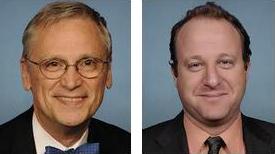
Polis's Ending Federal Marijuana Prohibition Act would remove the DEA's authority over marijuana, end federal marijuana prohibition, and leave it to the states to decide whether to prohibit marijuana or not. Blumenauer's Marijuana Tax Equity Act, House Bill 501, would create a federal excise tax on marijuana similar to those imposed on alcohol and tobacco. Taken together, the two bills would provide for a system of marijuana regulation and taxation in states where it is legal.
More specifically, Polis's bill would:
- Remove marijuana from the Controlled Substances Act;
- Transfer the Drug Enforcement Administration’s authority to regulate marijuana to a newly renamed Bureau of Alcohol, Tobacco, Marijuana and Firearms, which will be tasked with regulating marijuana as it currently does alcohol;
- Require marijuana producers to purchase a permit, as commercial alcohol producers do, of which the proceeds would offset the cost of federal oversight; and
- Ensure federal law distinguishes between individuals who grow marijuana for personal use and those involved in commercial sale and distribution.
Blumenauer's bill would:
- Impose a 50% excise tax on the first sale of marijuana, from the producer to the next stage of production, usually the processor;
- Impose an occupational tax similar to those in the tobacco and alcohol industries on those operating in marijuana, with producers, importers and manufacturers facing an occupation tax of $1,000 per year and any other person engaged in the business facing an annual tax of $500 per year;
- Impose civil penalties for failure to comply with taxing duties. Criminal penalties will be assessed for intentional efforts to defraud the taxing authorities; and
- Require the IRS to produce a study of the industry after two years, and every five years after that, and to issue recommendations to Congress to continue improving the administration of the tax.
The time has come for marijuana law reform at the federal level, the two congressmen said.
"There has been an enormous evolution of American opinion on marijuana. Americans are sick and tired of the costs of marijuana prohibition, whether it’s the financial costs or the human costs. Americans are saying enough is enough, let's try a new policy. We need to address drug use as a public health issue, not a criminal justice one," said Polis.
"My bill doesn't affect the legal status of marijuana where it is currently illegal," the Colorado congressman explained, "but it does allow states that have created either a legalized and regulated scheme for sales or that have medical marijuana laws to operate, without the constant fear that the federal government and the DEA and the other agencies will prosecute patients or businesses that are fully legal under state law. This is an idea whose time has come."
"Forty years ago, as a freshman member of the Oregon legislature, I was able to vote to make Oregon the first state to decriminalize the possession of small amounts of marijuana," said Blumenauer. "Since then, 14 states have joined Oregon, and after California legalized medical marijuana in 1996, we now have 19 jurisdictions that have authorized it, and we now have the first two states that have legalized marijuana for recreational use."
The Oregon congressman added that he and Polis are working with a bipartisan group of representatives and that up to eight or 10 marijuana reform bills could be introduced this session.
"We're looking at antiquated and sometimes nonsensical federal laws and policies to try to get us on a path that is less expensive, more productive, more fair, and more in tune with where America is going," Blumenauer said. "We arrested two-thirds of a million people in 2011 for a substance most people think should be legal. The president said he has bigger fish to fry, but there are still people further down the federal food chain frying those fish."
"This is a very exciting day," said Bill Piper, director of national affairs for the Drug Policy Alliance. "Last November, voters in Colorado and Washington made history, and the polling shows that a majority of Americans now support legalizing marijuana. There is no doubt more states will legalize in the years to come. This is the beginning of the end of marijuana prohibition."
"We were a primary backer of Amendment 64 in Colorado, which directed the state to regulate marijuana in a manner similar to alcohol," said Steve Fox, director of government relations for the Marijuana Policy Project. "That's how we believe it should be treated, and we look forward to working with Reps. Polis and Blumenauer to see that this legislation is eventually passed by Congress."
If not this year, then soon, the congressmen said.
"There is growing support for this bill," Polis argued. "There has really been a sea change; we saw test votes in the last Congress for defunding the DEA and other things, and saw very strong support, and that will only increase over time. Congress is frequently a lagging indicator for public opinion; it’s a question of Congress catching up."
"This is the beginning, not the end," said Blumenauer. "My bill is a first step and we anticipate some give and take, but this will be gaining momentum. We've got legislation here today to get the ball rolling, but there will be more that you will be hearing about in the days ahead."
"It's clear that we've reached a tipping point," said Piper. "Major changes are going to happen and are happening now. The American people are demanding reform, and members of Congress are starting to give it to them."
Look Out, New York, It's Credico For Mayor! [FEATURE]
New York City has earned itself the sobriquet of Marijuana Arrest Capital of the World, with tens of thousands of minor pot possession arrests every year -- mostly of young men of color -- generated in good part by the city's equally infamous stop-and-frisk policing, again aimed primarily at the city's young and non-white residents. There's a man running an outsider campaign for the mayor's office there this year who wants to end all that.
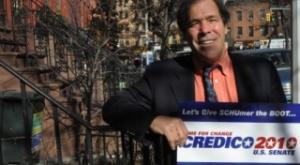
The inventively funny, yet deadly serious, agitprop artist has an ambitious 17-point program for his first day in office, with promises that range from going after "the biggest criminals in our city" -- the Wall Street bankers -- and reforming the city's tax code to favor the poor to rolling back privatization of city schools and reforming various city agencies.
But just beneath banksters and taxes is a vow to begin reining in the NYPD by firing Police Commissioner Ray Kelly (to be replaced with Frank Serpico) and "abolishing the NYPD’s unconstitutional policies of racial profiling, stop and frisk, domestic spying, entrapment, and its infamous (albeit unadmitted) 'quota system.'"
Central to that policing reform plank, Credico says, is reclassifying the smoking and carrying of marijuana as no longer an arrestable offense. He also vows to fire any officer who lies or perjures himself on the stand, and to bar the use of "no-knock" warrants and stun grenades "except in the case of legitimate terrorist attack."
And he wants to replace the city's Special Narcotics Office with a Harm Reduction Office, whose leadership he has offered to Drug Policy Alliance head Ethan Nadelmann. He also vows to shut down the Rikers Island prison and turn it into a treatment center and education facility with a state of the art library, and to nominate law professor Michelle Alexander, author of The New Jim Crow: Mass Incarceration in the Age of Color-blindness, to run it.
That's quite a tall order for a first day in office, but Credico says he's up for it.
"I plan to stay up for 24 hours and get all that stuff done," he told the Chronicle.
Of course, first he has to win the Democratic Party nomination and then win the general election, and that's a pretty tall order, too. There is a bevy of candidates (polling data at the link as well) running for a shot at the prestigious post, and he is facing stiff establishment opposition in the primary, most notably from Public Advocate Bill de Blasio and the as yet officially undeclared city council Speaker Christine Quinn, who leads the other Democrats in early polls, but is in a close race with "undecided."
The Republican race includes a handful of announced or potential candidates led by former Metropolitan Transit Authority head Joseph Lhota (who still trails "undecided" by a large margin) and NYPD Commissioner Ray Kelly, who is as yet unannounced. The Libertarians may also field a candidate this year, possibly former "Manhattan madam" and gubernatorial candidate Kristin Davis, and we can't forget the Rent Is Too Damn High Party, either.
"The GOP has a rich guy who just jumped in, and the Democrats have a six-pack of hacks, all getting money from the real estate interests and Wall Street and none of whom will talk about the issues," Credico explained. "The Democrats are all doing the Schumer act -- just talking about the middle class, not the poor, the homeless, the division between the rich and poor, not about drug policy. This city is virtually a police state right now."
Credico has a remedy for that: Elect him.
"I will get rid of Police Commissioner Ray Kelly, who is a combination of J. Edgar Hoover and Joseph Fouche, Napoleon's dreaded head of the secret police. Everyone is afraid of him. He's got the Red Squads going; they were infiltrating groups at Occupy Wall Street. Kelly is doing all these joint operations with the feds under the guise of fighting terrorism, and this city is crawling with undercover cops -- FBI, DEA, AFT, all running joint task forces with the NYPD. They've foiled 14 plots, all hatched by the NYPD. Ray Kelly has way too much power," the veteran activist said flatly.
"There is a lot of money not only in the prison industrial complex, but also the police industrial complex," Credico noted. "They have asset forfeiture and lots of new schemes, tons of undercover agents, who are really there to beat up on the black community. They infiltrate, demonize, and destroy lives, and this has to stop."
Credico has been active in the Occupy Wall Street moving, having been arrested five times by the NYPD, but before that, he was active in the city's minority communities for years, working to reform the Rockefeller drug laws with the William Moses Kunstler Fund for Racial Justice (in between stints flying out to Tulia, Texas, to deal with the bogus mass arrests of black men on drug charges there), and fighting stop-and-frisk. He currently is taking time out of his days to attend hearings in the criminal trial of the NYPD officer who shot and killed unarmed 18-year-old Ramarley Graham in his own bathroom as he was flushing a bag of weed down the toilet.
"I go to every one of the court dates and sit right next to his mother," he said. "This cop invaded Ramarley's house and shot him in the head for weed, but it's not an isolated incident. No cops go to jail for killing a black person, but a spit on a cop and you can go to jail for years. This is just one cop -- and he's like the Lt. Calley of the NYPD. [Editor's Note: Calley was the sole US Army officer convicted of a crime in the Vietnam War My Lai massacre.] It's not an isolated incident; it's the policy, the same policy that killed Ramarley Graham and Sean Bell and Amador Diallou. So many people have been killed by the NYPD, and it's not just the guys on the street; it's a brutal force."
Marijuana could also be a wedge issue for him, Credico said.
"I'm a committed pot smoker, and I think it should be legal, and I'm the only candidate saying it should be legal. Of course, it's up to the state legislature to do that, but I would direct the NYPD not to enforce those laws and particularly not to arrest anyone."
Under current state law, pot possession is decriminalized, but beginning with Mayor Rudy Giuliani, the NYPD had a policy of turning what should have been tickets for possession into misdemeanors by either reaching in someone's pocket and removing the baggie or intimidating the person into revealing it himself, thus elevating the offense from an infraction to the misdemeanor of "public possession." Under increasing pressure over the tactic, Commissioner Kelly last year issued an order for it to stop, and arrests have declined somewhat, but still remain at unacceptably high levels.
In 2011, there were some 50,000 marijuana possession arrests in the city, nearly 80% of them of people of color. Nearly one-quarter (12,000) were youth aged 16 to 19, and of those, 94% had no prior criminal records.
And it's not just marijuana, Credico said.
"There should be no more prosecutions for drug possession," he said. "They should be going after the real criminals, the guys on Wall Street. They don't have to go up to Harlem and Washington Heights, the real big barracudas are right down here."
The city's criminal justice system is rotten to the core, he said.
"This is like Tulia, this is like the South," he moaned. "The criminal justice system here is a black box where blacks and Latinos go in and disappear into the penal system. The cops are white, the judges are white, the prosecutors are white -- only the Bronx has a rainbow coalition of prosecutors -- the rest are white, and they're going after black people in this city."
Many of those busted ended up in Rikers Island or the Tombs, often after first spending hours or days crammed into precinct holding cells.
"Rikers Island is like Alcatraz for poor people on minor drug offenses," said Credico. "It's all Mickey Mouse; there's no Hannibal Lectors there. They need to turn it into a university for poor people. And no one is talking about the Tombs. I've been there. There are lots of junkies in there going through withdrawals, filthy toilets, people penned in like cattle. No one will talk about that, or about the hundreds of precincts with their holding cells."
Unsurprisingly, Credico doesn't think much of his establishment opposition.
"Christine Quinn is Bloomberg in drag wearing a red wig," he declared, "and de Blasio supported stop-and-frisk. He was also Hillary's hit man when she was running for the Senate, and derailed Grandpa Munster Al Lewis's campaign then."
Lhota, who has recently made noises about legalizing marijuana, "looks like a weed head," Credico snorted. "But I actually smoke it."
Now, Credico has to go through the process of qualifying as a Democratic candidate, smiting his foes within the party, and then taking on the Republican challenger in the general election. His first official campaign task will be to complete a month-long signature-gathering drive in late spring to qualify for the primary.
"I'll be on talk shows -- people all over the place are asking for interviews -- making some ads and some YouTube videos, and they'll be interesting and funny. It will be a very entertaining campaign. We have buttons coming out soon, we have the web site, there are people who will be putting ads in the Nation," he explained.
"Drug reformers are interested in my campaign, and I've got tons of volunteers from the stop-and-frisk campaigns and people from OWS," he said. "I'm getting a lot of attention right now."
Credico, of course, is a long-shot, but even if he doesn't become the next mayor of New York, to the degree that his campaign shines a light on the problems in the city's criminal justice system and forces other candidates to address them, he will be judged a success.
(This article was published by StoptheDrugWar.org's lobbying arm, the Drug Reform Coordination Network, which also shares the cost of maintaining this web site. DRCNet Foundation takes no positions on candidates for public office, in compliance with section 501(c)(3) of the Internal Revenue Code, and does not pay for reporting that could be interpreted or misinterpreted as doing so.)
Medical Marijuana Update
The California Supreme Court heard oral arguments in a key case on whether localities can ban dispensaries, and medical marijuana bills died in two Midwest states, and there's more news, too. Let's get to it:

Last Thursday, the Obama administration sought to dismiss a lawsuit by the city of Oakland defending its ability to issue permits for dispensaries. Oakland had sued the feds after US prosecutors moved against the Harborside Health Center, seeking to shut it down. The Justice Department argued that the city was using the wrong legal remedy, but Oakland argued that shutting down Harborside would send tens of thousands of patients into the streets seeking medicine, posing a threat to public safety in a city with crime problems. No ruling was made.
Also last Thursday, the LAPD raided a massive grow up that supplied dispensaries. LAPD officers and US Homeland Security gang agents found 1,500 pounds of marijuana and several firearms. Police said the warehouse grow did about $7.6 million in business every 60 days, and supplied numerous dispensaries in Southern California. Authorities also allege it was shipping marijuana to the Midwest and East Coast. Four people were arrested; their names have not been released.
On Monday, San Diego District Attorney Bonnie Dumanis dropped the charges against two medical marijuana patients. The move came in the cases of Clint Guidry and Cameron Mitchell, and represented a setback for the staunchly anti-medical marijuana Dumanis.
On Tuesday, LA City Attorney Carmen Trutanich said dispensaries should be allowed to operate in the city. Up for reelection, the formerly anti-dispensary Trutanich said he was endorsing a city council initiative that would allow the 100 to 180 retailers that existed before a fall 2007 city moratorium on dispensaries to essentially carry on so long as they follow certain rules. A second initiative also set for the ballot would allow virtually all of the city's hundreds--possibly up to a thousand--dispensaries to stay open.
Also on Tuesday, the state Supreme Court heard oral arguments in a key dispensary ban case. The issue is whether the city of Riverside's ban on dispensaries violates the state's medical marijuana laws. Questioning by the justices suggested that they were prepared to agree with the city that the state constitution gives cities wide policing power over land use and suggested that the state's medical marijuana laws have not undercut that authority.
On Wednesday, DEA agents and San Bernardino police raided a chain of dispensaries and a private residence. The raiders hit Kush Concepts at three locations, where they marched patients out of the dispensaries. City officials said there are 41 dispensaries in San Bernardino.
Also on Wednesday, an appeals court upheld Tehama County's cultivation ordinance. A group of medical marijuana patients sued over the ordinance in 2010, arguing it was unconstitutional and conflicted with the Compassionate Use Act. The county prevailed in Superior Court, and that decision was appealed. Now that appeal has been lost.
Colorado
Last Tuesday, the first applications for Fort Collins dispensary licenses were submitted. The city had had 21 dispensaries that were forced to close when voters chose to impose a ban in 2011. The ban was overturned by voters in November, and now the dispensaries are coming back.
Iowa
Last Thursday, legislators killed a medical marijuana bill. House Public Safety Committee Chair Clel Baudler (R-Greenfield) call it one of the "stupidest" bills he had ever seen. He was joined by the other Republican on the three-member panel in voting to kill it.
Massachusetts
On Sunday, state officials said they may not make the deadline to come up with medical marijuana regulations. They are required to have them in place by May 1, but health officials said the complexity of the issues was such that they were unlikely to be able to comply. Medical marijuana advocates responded that any delay is unjustified and would cause patients to suffer.
Michigan
On Tuesday, a report said the state had collected $10 million in revenues from medical marijuana program applicants. The report covered the period through the end of the state's budget year on September 30. It says the revenue intake was nearly double that needed to run the program.
Montana
Last Friday, Chris Williams was sentenced to a mandatory minimum five years in prison for his role in Montana Cannabis, the state's largest dispensary during its short-lived medical marijuana boom. He had been facing more than 90 years in federal prison after refusing plea agreements and then being convicted of marijuana cultivation and firearms offenses in federal court (they had a shotgun at their grow op), but in the face of a public outcry, prosecutors sought and got an unusual post-conviction plea bargain limiting his prison exposure.
South Dakota
On Tuesday, a medical marijuana bill was killed in the legislature. It went down on a 7-6 vote in the House Health and Human Services Committee. Medical marijuana bills have been repeatedly introduced since 2001, only to die. South Dakota voters have also twice rejected medical marijuana initiatives.
"Should the Drinking Age Be Lowered from 21 to a Younger Age?," on ProCon.org
Did you know the drinking age is an example of continuing societal debate over how best to regulate legal drugs? Read what different thinkers have to say, at "drinkingage.procon.org," part of the ProCon.org family.
This is the fifth in a six-part series of ProCon.org teasers being published in Drug War Chronicle. Keep tuning in to the Chronicle for more important facts from ProCon.org the next several weeks, or sign up for ProCon.org's email list or RSS feed. Read last week's Chronicle ProCon.org highlight piece here.
ProCon.org is a web site promoting critical thinking, education, and informed citizenship by presenting controversial issues in a straightforward, nonpartisan primarily pro-con format.

Poll: Feds Should Leave Legal Marijuana States Alone
Strong majorities of Americans believe people should be able to use, grow, and sell marijuana in states where it is legal, according to a new Reason Foundation-Rupe poll. Nearly three out of four (72%) said pot smokers should not be arrested in those states, more than two-thirds (68%) said the federal government should not arrest growers in those states, and nearly two-thirds (64%) said it should not arrest sellers.

The poll consisted of a representative sample of 1,000 American adults interviewed by telephone, half by landline and half by cell phone. It has a margin of error of +/- 3.8%.It was conducted between January 17 and 21.
Although it is Republicans who typically make states' rights or federalist arguments, Republicans had the highest level of support for federal interference in states that have legalized marijuana. In all three cases -- using, growing, or selling marijuana -- independents and Democrats were more likely to say the federal government should not interfere.
The poll also asked two questions about marijuana legalization, one about whether it should be treated like alcohol and one about whether it should be legalized for recreational use. While the two questions are essentially identical, they generated slightly different responses, showing yet again that marijuana legalization is on the cusp of majority acceptance (and that the phrasing of polling questions matters).
Some 53% agreed that marijuana should be treated like alcohol, but only 47% agreed that recreational use should be legalized. Majorities of Democrats (57%) and independents (58%), but not Republicans (35%), agreed with "like alcohol," while only a majority of independents (59%) supported legalization for recreational use, with support at only 46% for Democrats and 25% among Republicans.
Gender and age differences also remained. Support for legalization was higher among men (52%) than women (42%), and there was majority support for legalization among all age groups except people over 65, two-thirds of whom opposed it.
Rhode Island Marijuana Legalization Bill Filed
State Rep. Edith Ajello (D-Providence), chair of the House Judiciary Committee, announced Wednesday she had introduced a bill to make marijuana legal for adults 21 and over and to establish a system of taxation and regulation for marijuana commerce.
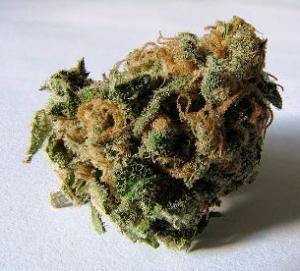
Her bill, House Bill 5274, the Marijuana Regulation, Control and Taxation Act, would:
- remove criminal penalties for the private possession of up to one ounce of marijuana and for the home-growing of up to three mature marijuana plants in an enclosed, locked space;
- establish a tightly regulated system of licensed marijuana retail stores, cultivation facilities, and testing facilities;
- enact an excise tax of up to $50 per ounce on the wholesale sale of marijuana applied at the point of transfer from the cultivation facility to a retail store (sales tax will also be applied at the point of retail sales); and
- require the Department of Business Regulation to establish rules regulating security, labeling, health and safety requirements, as well as rules requiring advertising of marijuana to be no less restrictive than advertising of tobacco.
The bill has the support of both local and national marijuana reform groups.
"As a public health researcher, I know that regulation works," said Michelle McKenzie, a spokesperson for the statewide Coalition for Marijuana Regulation. "Over the past 20 years, we have reduced levels of teen cigarette use by nearly 50%, and we have done it through enacting strict regulations and providing comprehensive, evidence-based public education. We can do the same thing when it comes to marijuana. I am confident that regulating marijuana will make Rhode Island a safer and healthier place to live."
"State and federal lawmakers from around the nation are bringing forward proposals to regulate marijuana like alcohol, and they are being met with more public support than ever before," said Mason Tvert, a spokesman for the Marijuana Policy Project. "Most Americans are fed up with laws that punish adults simply for using a product that is objectively less harmful than alcohol. The bill introduced today in Rhode Island presents a smarter, more responsible approach to marijuana."
The bill has been referred to the House Finance Committee.
Rhode Island is the fourth state to see marijuana legalization legislation filed this year. The others are Hawaii, Massachusetts, and New Hampshire. Similar bills are expected to be filed in Maine, Pennsylvania, and Vermont.
Mitch McConnell Endorses Kentucky Hemp Bill
In a statement last Thursday, Senator Mitch McConnell (R-KY), the minority leader in the US Senate, endorsed pending legislation in his home state that seeks to reintroduce industrial hemp cultivation there. The bill already has the support of the state's other US senator, Rand Paul, and Agricultural Commissioner James Comer, who were instrumental in bringing McConnell on board.

But McConnell first had to be reassured that industrial hemp wouldn't somehow turn into recreational marijuana. Comer apparently managed the trick.
"Commissioner Comer has assured me that his office is committed to pursuing industrialized hemp production in a way that does not compromise Kentucky law enforcement's marijuana eradication efforts or in any way promote illegal drug use," McConnell said.
In a statement of his own last Thursday, Comer expressed enormous gratitude for McConnell's support.
"When the most powerful Republican in the country calls to discuss your issue, that's a good day on the job," Comer said. "Leader McConnell's support adds immeasurable strength to our efforts to bring good jobs to Kentucky."
The hemp bill, Senate Bill 50, sponsored by Sen. Paul Hornback (R-Shelbyville), would direct the state Agriculture Department to create a program for licensing industrial hemp producers, but would not go into effect until there is a change in federal law, which bans the production -- but not the importation -- of industrial hemp.
In addition to both US senators, the bill has also garnered the support of two of the state's six US representatives, US Reps. John Yarmuth (D) and Thomas Massie (R). The two congressmen, Sen. Paul, and Commissioner Comer will all testify in favor of the bill.
"Our federal delegation is showing tremendous leadership," Comer said. "They recognize this is not a partisan issue. It's about jobs. And we will continue to push forward to make sure Kentucky is first in line for them."
State legislative leaders are also firmly backing the bill. Senate Majority Leader Damon Thayer (R-Georgetown) joined Sen. Hornback in convincing the Northern Kentucky Chamber of Commerce to endorse the bill. It did so Wednesday.
The bill gets a hearing in the Senate Agriculture Committee on February 11.
Colombia Set to Decriminalize Ecstasy, Meth
Colombian Minister for Justice and Law Ruth Stella Correa said last Wednesday that the government will propose decriminalizing the possession of small amounts of synthetic drugs, such as ecstasy and methamphetamine, according to local press accounts. She added that a drug policy advisory commission would revise the country's drug law and present the proposal to congress.

Currently in Colombia, people are not prosecuted for the possession of small amounts of marijuana and cocaine. She said the proposal would extend that protection to users of synthetic drugs like methamphetamine and ecstasy.
"The proposal aims to standardize the amount of drugs already permitted, while also allowing an equivalent quantity of synthetic drugs," she said. "We have to accept that Colombia is a consumer country -- this is also our reality -- and being a consumer country, we can't just throw drug users in jail, but we must look after them. I don't see the risk in establishing a personal use amount of synthetic drugs, since we are only trying to clarify things to achieve treatment for addicts and users, not to send them to prison."
Colombian constitutional court rulings have established a right to possess personal use amounts of drugs, but the government has not established what those personal use amounts of synthetic drugs are. The advisory commission will do that. The government of President Santos has also embarked on a more than rhetorical shift toward a public health approach to drug use, and Correa emphasized that in her remarks.
"We are convinced that drug policy should be designed with a holistic approach, involving families, the education system, the public health specialists, development practitioners and community leaders," she said.
Not everyone agrees with the move. Former President Alvaro Uribe, who tried repeatedly to undo those Colombian court rulings legalizing drug possession, came out swiftly against including the synthetics.
"With this personal use amount, what they are doing is validating the actions of the dealers and not taking them to prison, nor are they taking the addicts to the hospital," he complained. Decriminalizing the synthetics would only "further enslave the youth and drug more assassins to kill more people," he claimed.
Virginia Welfare Drug Testing Bill Defeated
A bill backed by Republicans that would have required drug screening and testing of welfare recipients died Monday in the Virginia Senate. The measure failed by one vote in the evenly divided Senate when one Republican didn't vote.
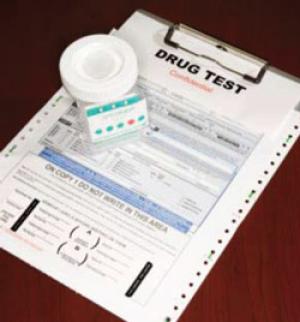
The measure, Senate Bill 271, introduced by Sen. Charles Carrico (R-Grayson), would have required the state's welfare-to-work program to screen participants "to determine if probable cause exists to believe the participant is using illegal substances" and, if such a determination is made, "a formal substance abuse assessment of the participant, which may include drug testing."
Those who tested positive would have to enter a drug treatment program or lose benefits for a year. Those who refused to be tested would also lose benefits for a year.
Similar legislation is afoot in a number of other states. Some states, like Virginia, have attempted to overcome constitutional problems with suspicionless drug testing by providing for an initial screening to come up with probable cause, but even that fix hasn't managed to overcome political problems in most states.
Opponents of such legislation argue that such programs cost more money than they save, that they are an attack on poor people, and that there is no evidence of widespread drug use among public benefits recipients.
"Why are poor people singled out for testing," asked Sen. Marnie Locke (D-Hampton) before voting against the bill. "Why not legislators or bailed-out CEOs?"
South Dakota Medical Marijuana Defense Bill Defeated
A bill that would have allowed South Dakotans charged with misdemeanor marijuana possession to mount a medical necessity defense was defeated Tuesday in the state legislature. The bill died on a 7-6 vote in the Health and Human Services Committee.
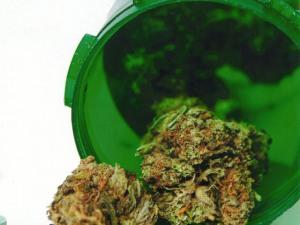
The bill, House Bill 1227, would have allowed people caught with less than two ounces of marijuana to mount a medical necessity defense against either a pot possession charge or the state's unique ingestion for the purposes of intoxication charge. It provided for such a defense to be mounted if "a competent medical authority" has recommended its palliative use or if its use is known to be palliative for a given condition.
The defeat in Pierre only adds to the state's reputation as one of the most medical marijuana-unfriendly in the country. Medical marijuana bills have been introduced repeatedly there since 2001, but never go anywhere, and the state has the dubious distinction of being the first to defeat an initiative legalizing medical marijuana and the only one to do it twice, in 2006 and 2010.
"If you talk to drug users, nine times out of 10 they started with marijuana first," said Rep. Melissa Magstadt (R-Watertown), reiterating the long discredited gateway theory. The registered nurse also cited opposition to the bill from the state's medical and nursing associations.
"This is about being compassionate to our folks," said Sen. Karen Soli (D-Sioux Falls). "When I first heard of this, I thought no way. I'm not in favor of legalizing marijuana," she added. "It's quite a surprise to me I'm going to vote for this."
The bill's sponsors, Rep. Dan Kaiser (R-Aberdeen), a police officer, and Sen. Craig Tiezen (R- Rapid City), a retired police chief, testified before the committee last week. They told legislators the bill would not legalize marijuana or allow for advance doctor's recommendations, but would allow someone charged with possession to argue in court that they needed it for medical reasons and present evidence to make their case, with the final decision in the hands of the trial judge.
The South Dakota Supreme Court in 2003 rejected the use of the medical marijuana necessity defense in the case of a wheelchair-bound man. This bill would have made the defense available as part of state law.
This Week's Corrupt Cops Stories
A Massachusetts cop had his own informal prescription drug take-back program, but that was pretty innocuous compared to some of this week's other entries. Let's get to it:

In San Luis Obispo, California, a San Luis Obispo narcotics officer was arrested Tuesday for providing fake pain pills to a snitch in exchange for cash. Corey Pierce, 39, is now charged with bribery. The snitch was going to sell the bogus pills to a third party, who would then peddle them to unwitting customers. The fake pills are often used in drug enforcement operations, the police said. He had been assigned to the California Bureau of Narcotics Task Force until it was dissolved and was a member of the Sheriff's Office Narcotics Unit. He has been suspended with pay.
In Charlotte, North Carolina, a former Cherryville narcotics detective pleaded guilty last Thursday to receiving stolen goods, taking bribes, and stealing money. Frankie Dellinger, 41, was one of several men, including three other police officers, caught up in a federal undercover sting. He pleaded guilty to conspiracy, money laundering, and two counts of extortion. No word on how many years he's facing.
In Atlanta, two former TSA agents were sentenced last Wednesday for a scheme to smuggle drugs through Hartsfield-Jackson Airport. Richard Cook, 28, and Timothy Gregory, 26, got 11 years and six years, respectively. They went down in a sting after authorities received information that Cook was willing to be corrupted. Undercover officers posing as Mexican drug cartel representatives met with Cook and provided him with three kilograms of what he thought was heroin and $3,500 in cash in partial payment for his services. After repeated deliveries of fake drugs, Cook enlisted Green, and he similarly ensnared himself.
In Camden, New Jersey, a former Camden narcotics officer was sentenced last Thursday for his role in a corrupt dope squad that has already seen three other officers either convicted or pleading guilty of various charges. Jaston Stetser, 34, admitted to planting drugs on suspects, carrying out illegal searches, and stealing drug money along with the rest of his crooked crew. He pleaded guilty to conspiracy to deprive others of their civil rights. The dirty narcs forced prosecutors to dismiss some 200 drug arrests and convictions.